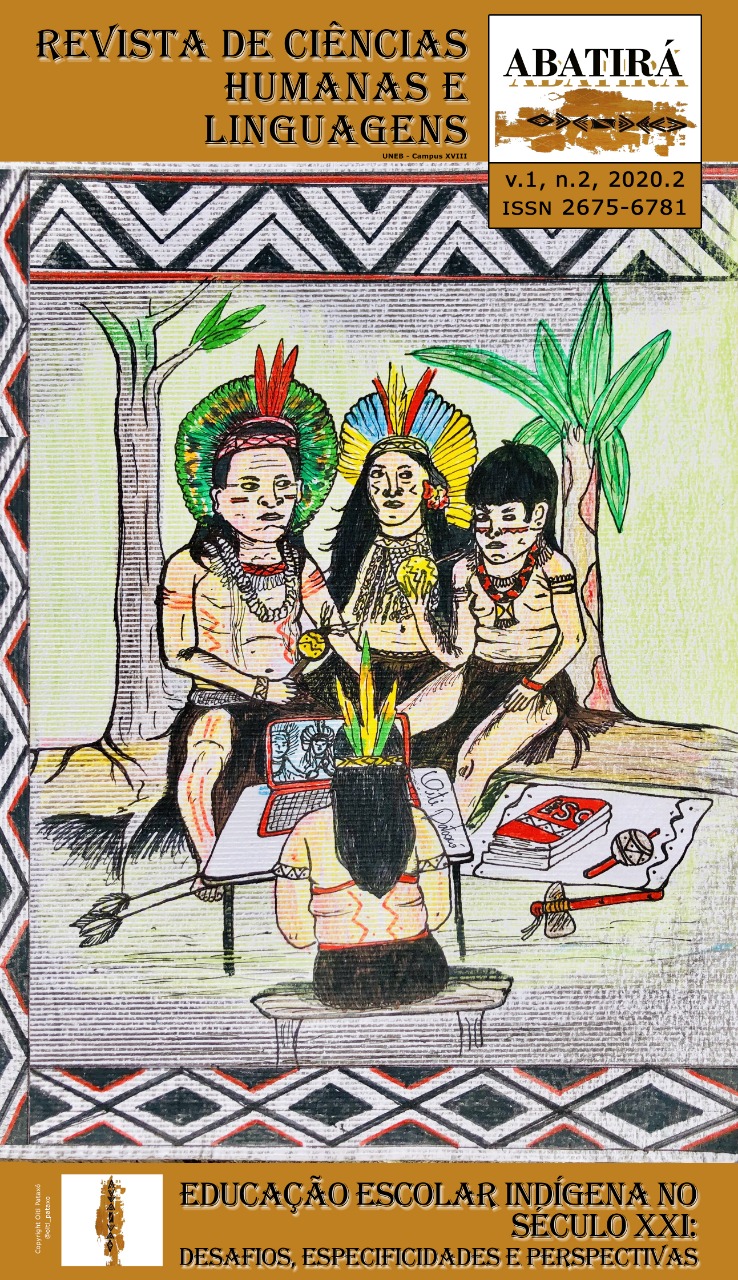Mailing genre
Rób’udzé nhimi rówatsu’u hã niwa tewa pari õdi duré rópótó nori mrémé hã wapari õdi
Abstract
In this article, we discuss the nature mailing genre according to the cosmopolitical conception of language, for which all beings of nature are able to interact communicatively. When the communication promoted by nature creatures is not taken into account, there might be unbalance in the cosmos and, consequently, environmental loss which may cause these creatures to get sick. Throughout a communicative situation as well as a discursive communication, all creatures and the cosmos elements are considered. Activities and interactions, from this conception of world and language, are not exclusively human but involve both the human and the non-human which form and keep the balance of nature. Nature mailing genre establishes interactions between human beings and non-human beings in nature. These interactions may occur in the woods or between the woods and another environment, that is, this communication might be between environments or between cosmoses. In our discussion, we shall emphasize the message or warning that birds send out to human beings within the woods or other places. These messages might be sad or joyful; in this article, we shall focus on the sad ones. This sort of news makes people define these birds as bad omen birds. Our discussion is empirically grounded on a concrete communicative situation that took place in a classroom context of the authors' institution in 2016. The theoretical basis adopted is the assumption about the discursive genre of Bakhtin (2016), with a cosmolinguistic interpretation. In this interpretation, the woods messages, transmitted by messenger birds, form the nature mailing genre and expand the Bakhtinian notion of genres of oral discourse, in addition to proposing a nomenclature for these genres, a difficulty pointed out by the theory of discursive genres. By discussing it, we intend to contribute to studies on both cosmopolitical communication and discursive genres related to everyday life.
Keywords: Cosmopolitical communication; Cosmolinguistic; Discursive genres; Nature mailing.
Downloads
References
ANZALDÚA, Glória. Falando em línguas: carta para as mulheres escritoras do terceiro mundo. Estudos Feministas, 2000, pp. 229-236.
ANZALDÚA, Glória. Bordelands/La frontera – the new mestiza. San Francisco: Aunt Lute Books, 2012.
BÁEZ, F. A história da destruição cultural da América Latina: da conquista à globalização. Rio de Janeiro: Nova Fronteira, 2010.
BAKHTIN, Mikhail. (Org. Trad. Paulo Bezerra). Os gêneros do discurso. São Paulo: Editora 34, 2017.
HANKS, William F. Língua como prática social – das relações entre língua, cultura e sociedade a partir de Bourdieu e Bakhtin. (Org. Anna Christina Bentes, Renato C. Rezende, Marco Antônio R. Machado). São Paulo: Cortez, 2008.
KILOMBA, Grada. (Trad. Jess Oliveira). Memórias da plantação – episódios de racismo cotidiano. Rio de Janeiro: Cobogó, 2019.
LUCIANO, Gersem José dos Santos [Baniwa]. As línguas e as cosmologias indígenas. IX Simpósio Linguagens e Identidades da/na Amazônia Sul-Ocidental - Línguas e Literaturas Indígenas, 2015. Disponível em: <https://www.youtube.com/watch?v=xJ0OT7kLVZo>. Acesso em: 20 jan. 2017.
LUCIANO, Gersem José dos Santos. Língua, educação e interculturalidade na perspectiva indígena. Revista de Educação Pública. Universidade Federal do Mato Grosso. V. 26, N. 62/1, 2017, pp. 295-310. Disponível em: <http://periodicoscientificos.ufmt.br/ojs/index.php/educacaopublica/article/view/4996>. Acesso em: 10 nov. 2018.
MIGNOLO, Walter. Histórias locais/projetos globais. (Trad. Solange Ribeiro de Oliveira). Colonialidade, saberes subalternos e pensamento liminar. Belo Horizonte - MG: Ed. UFMG, 2003.
MIGNOLO, W. Epistemic Disobediense, independent thought and de-colonial freedom. Theory, culture & society. Vol. 26, N. 7 - 8, pp. 1 - 23, 2009.
MUNDURUKU, Daniel. Coisas de onça. São Paulo: Mercuryo Novo Tempo, 2011.
NEUMANN, Eduardo. Letra de índio – cultura escrita, comunicação e memória indígena nas Reduções do Paraguai. São Bernardo do Campo-SP: Nhanduti Editora, 2015.
ARTIGO DA AUTORA, 2015.
ARTIGO DA AUTORA, 2017.
ARTIGO DA AUTORA, 2019.
RODRIGUES, Eunice Moraes da Rocha. Português Tapuia: um signo de resistência indígena. Revista Porto das Letras, V. 4, N. 1, 2018. Disponível em: <https://sistemas.uft.edu.br/periodicos/index.php/portodasletras/article/view/5532/13267>. Acesso em: mar. 2018.
SANTOS, Boaventura de Sousa. A gramática do tempo: para uma nova cultura política, para um novo senso comum. Porto: Afrontamentos, 2006.
TSÕRÕPRÉ, Cristóvão Tserero’odi. Comunicação oral. Conferência Regional de Educação Escolar Indígena – Aruanã-GO. Dez. 2016.
VIEIRA, L. A. Instituição dos autores.
Downloads
Published
How to Cite
Issue
Section
License

Este trabalho está licenciado sob uma licença Creative Commons Attribution 4.0 International License.Você é livre para:
Compartilhar - copia e redistribui o material em qualquer meio ou formato; Adapte - remixe, transforme e construa a partir do material para qualquer propósito, mesmo comercialmente. Esta licença é aceitável para Obras Culturais Livres. O licenciante não pode revogar essas liberdades, desde que você siga os termos da licença.
Sob os seguintes termos:
Atribuição - você deve dar o crédito apropriado, fornecer um link para a licença e indicar se alguma alteração foi feita. Você pode fazer isso de qualquer maneira razoável, mas não de uma forma que sugira que você ou seu uso seja aprovado pelo licenciante.
Não há restrições adicionais - Você não pode aplicar termos legais ou medidas tecnológicas que restrinjam legalmente outros para fazer qualquer uso permitido pela licença.





